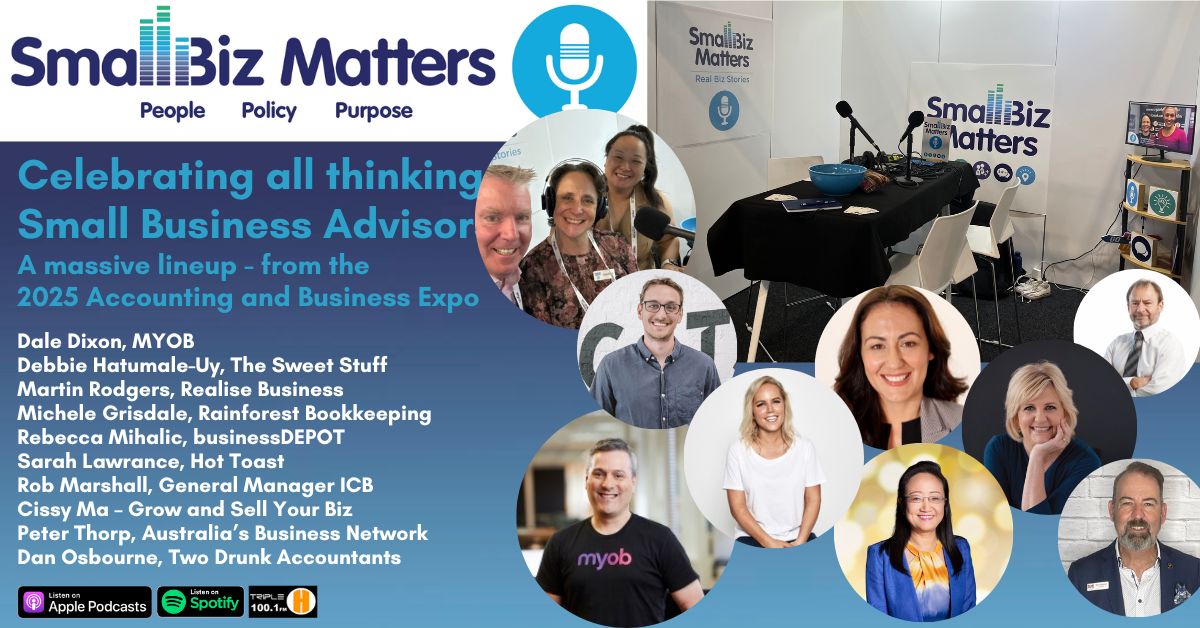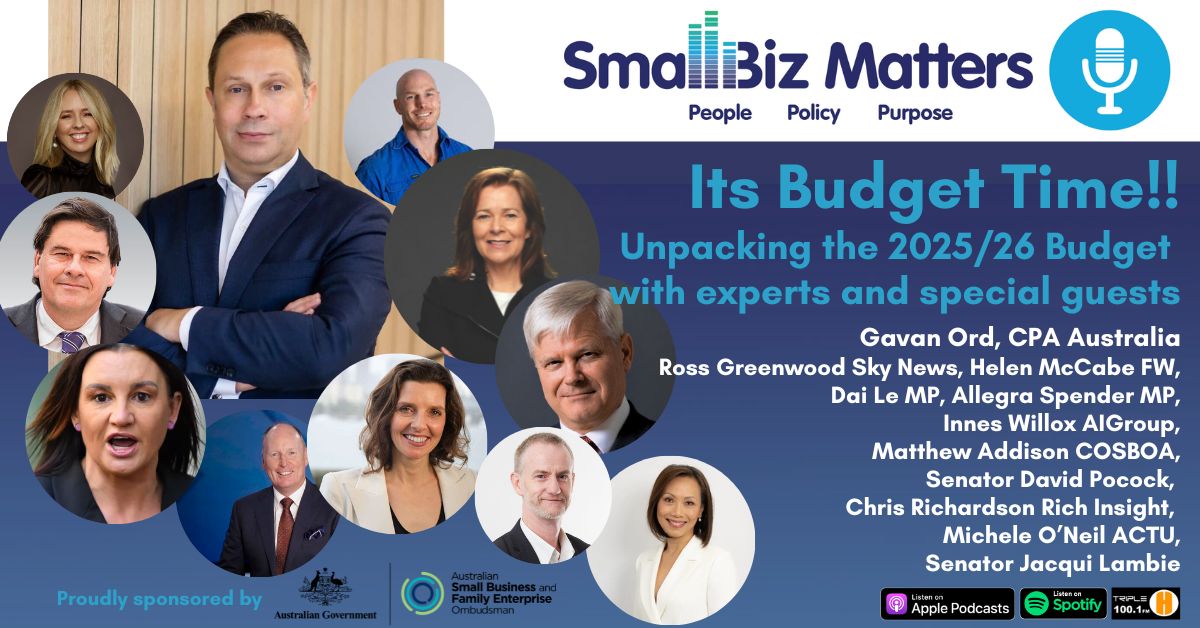Understanding the Sharing Economy and how to tap into it as a Small Business - 17/7/2018
| Tuesday July 17Small Biz Matters – a half hour program each week where you can work ON your business rather than IN it.
with Alexi Boyd from Boyd Office Management Services
Date: 17 July 2018
Some of us as Small Businesses shy away from the Sharing Economy; fearful of the unknown - the competition, lack of compliance and unsure of where we, as small businesses actually stand. But the fact is, if that’s your level of awareness of the Gig Economy, you’re missing out on a huge resource and income for new business. Melinda Livingstone from IncomeConnection is here to dispel those myths and help us, and educate us as small businesses on how to tap into the great opportunities the shared economy can provide.
Welcome to the show Melinda.
Topics we’ll be covering:
Tell about your journey, background, previous skills
I worked for over 20 years in the superannuation, investment and financial planning industry and one of the problems that I saw was that many people retire with not enough money to live comfortably. The age pension is insufficient and is being reduced all the time. For example last year my parents-in-law had their age pension cut due to threshold changes. A couple of weeks ago I read about cuts to energy concessions for age pensioners. So when I left my corporate job, I thought what can I do to solve that problem for ordinary Australians? Wages growth is flat, so it’s hard for working people to save more. I looked at the future of work as part of my thesis for my Masters degree and I became aware of the opportunities in the sharing economy. I learnt how we can generate an income by sharing what we already have. So I started my business to help ordinary Australians improve their income situation. And being a business owner, married to someone who works in a small business, I am very aware that the sharing economy has opportunities for small businesses as well. My background is in product development, technology and finance.
The Sharing economy - what is it?
-
It is creating value by sharing excess capacity.
-
The sharing economy is also called the gig-economy, collaborative consumption, the experience economy or the new economy.
-
It is nothing new, we have as a society been sharing things for a while. We are used to libraries, spotify music, eBay and second hand shops. It is just that technology has made it so much more convenient, efficient, affordable and transparent.
-
Examples - The platforms that you are likely to have heard of are Airtasker / Uber / AirBNB
Why has it exploded ?
-
On-demand technology, enabled by our mobile phones and cloud data storage
-
Secure payment now more comfortable
-
Testimonials / ratings facilitate trust
-
We have a desire for a greater with community, local business, smaller businesses
-
Move away from faceless organisations
-
Sustainability, avoiding the throwaway society
-
People look for experiences rather than stuff
-
Australian entrepreneurs are solving problems and making life easier
-
Supporting groups of people who find the conventional job market discriminate them - e.g. older workers, stay-at-home mums, migrants who otherwise find getting work difficult. These reasons are why the on-demand sharing economy is a major trend and is the future of work. Time Magazine described it as one of the ten ideas that will change the world.
What are the opportunities for Small business to tap in?
-
Firstly, if you have spare capacity; spare space such as spare office space, spare desks, spare warehouse space, perhaps your kitchen or cafe is unused for part of the day? Someone else may pay money to use your space.
-
Perhaps you have spare equipment that another business can pay to borrow?
-
Or spare capacity in your logistics, in your shipping?
-
Your business may have a large social media following?
-
Spare capacity of all different kinds can be monetised.
-
For spare office space, there is Liquidspace, Sharedesk and Rubberdesk. For industrial and retail space there is Altspce. For spare kitchen space, there is cookitoo.
-
For spare logisitics, there is FreightExchange. For spare equipment there is Mobilise. I am really just touching the surface of all the options available for businesses to monetise their space capacity
-
Secondly, you can save money. For example, expert online staff training on almost anything can be accessed at a cost of about $15 per course from Udemy. If you want to make a video, it used to cost at least $10,000 for a marketing agency to make one for you. Now if you know what you want, you can access the videograther from FreelanceCollective or Calling all Crew, the talent from The Right Fit, the background music from Envato. Cut out the middle-man and have more control
-
You can organise and pay for small tasks and only pay for what you need. Small business now has access to the sorts of products and services that previously were only accessible to large corporates; with transparency, in small, flexible parcels.
-
If you have no connections (e.g. migrants or are doing work in another city or new in business), these online market places make it easy to find a supplier, or several suppliers and choose the one that is right for you.
What are the pinch points that the sharing economy can solve:
-
In business we are time poor, we are looking for a quality result and a good price.
-
With the sharing economy, all sorts of problems can be solved easily. On Airtakser, a business can post any task that is legal and moral. The sorts of tasks that have been posted by businesses are include taking Instagramable photos of their branded cars in great locations, handwriting Christmas cards, doing a corporate gift drop or a setting up a flash mob as a promotion.
-
Other problems that can be solved include finding a quality meeting room for a client meeting for an hour almost anywhere you want at a good price on Sharedesk.
-
Attracting and paying for great talent for a day a week, perhaps to advise on an acquisition or a project from the platform Expert360. Unlike a consultant, they aren’t trying to hit you up for ungoing work.
-
Also if you need an employee for just a day, such as your receptionist is sick, you can send a request to Weploy and they can get a pre-screened worker to you straight away. Some businesses then like the person who has been sent and may offer them a job down the track.
-
Testing out options and getting feedback before going ahead. Traditional market research is expensive, but you can at very low cost put an ad on Airtasker for a few people in your target market and give them a task such as give you feedback on your website or meet you for an interview discussion.
Is it REALLY a threat to small business?
-
No, it is a resource to tap into. It’s also another way gain new clients. Some businesses will put their product or service on a sharing economy platform and see that as an additional another channel for them.
-
These platforms can help with the administration side - Weploy pays insurance, super, as they are the employer. If you rent out your spare space on Rubber desk, they manage the rent collection into your bank account.
-
There is a perception that the sharing economy is ‘a race to the bottom’ on price. Price is can be a factor, but other drivers such as choice and convenience are much stronger. In the recent Mary Meeker Internet Trends report, the average worker in the sharing economy in the US was earning an average of $34 per hour vs $22 for the average US worker. It is a big market place that includes the professionals on Expert360 earning up to $3,000 per day vs a host on MadPaws earning $25 for a doggy sleep-over. I know the owner of Airtasker is keen to set guidelines for the rates of jobs that are appropriate but it’s also a marketplace.
How do you tap in to the sharing Economy?
-
There are over 150 sharing economy platforms operating in Australia, many of them specialise in sharing between businesses. A marketplace is created when information flows freely between people; so your spare capacity becomes the solution to another businesses problem. If you are a bricks and mortar business, have good relations with your neighbours. Networking within other groups also helps. Joining business Facebook networking groups.
-
Think laterally about your opportunities, such as your:
-
spare office space / desks / meeting rooms
-
Spare parking spaces
-
Spare storage space
-
Outsource your staff if you have excess staff capacity (on secondment) rather than letting them go.
-
Restaurants who don’t utilise their space all the time for after hours for food prep or as an event space!
-
Understanding your seasonality on your business - look at your numbers!
-
Losing a key client
-
Times of year where you’re slower
-
-
Expert360 is where you can offer your services as a consultant (more premium as opposed to AirTasker)
-
Melinda is speaking at two events in Chatswood next month, on the 22nd and the 29th of August, if you are interested in hearing more there is information here on the IncomeConnection website. She has also written a free e-book on opportunities for businesses in the sharing economy.
To find out more about what has been covered today, go to their website: www.incomeconnection.com
About Melinda Livingstone, Founder IncomeConnection
Melinda is the Founder of IncomeConnection, a social enterprise that helps people find opportunity in the sharing economy. She has over Over 20 years experience in superannuation, investments and strategy for organisations such as ipac and Bridges Financial Services. Her last corporate role was as Head of Channel Development for Colonial First State, part of the CBA. She has a Bachelor of Commerce, a Masters in Business Management and is a Graduate of the Australian Institute of Company Directors. She is the Chairman of FOLIA, a charity that raises funds for children with disability and she is a volunteer with Sydney Refugee Teams, helping refugee families settle into life in Australia.





